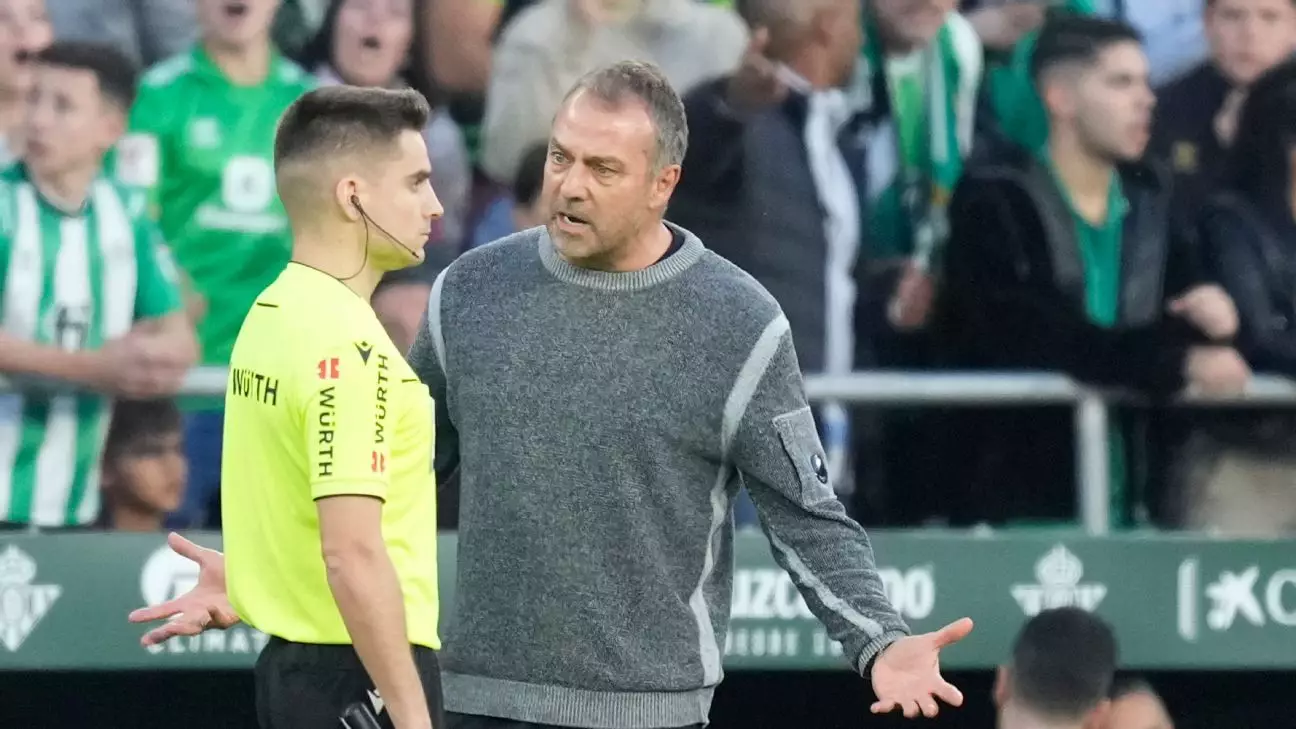In recent weeks, the spotlight has been intensely focused on refereeing in Spain’s LaLiga, sparked by a series of unfortunate events that have highlighted the increasing hostility faced by match officials. The situation has escalated to alarming levels, with referee José Luis Munuera Montero revealing that he has received death threats following a controversial decision involving Real Madrid’s Jude Bellingham. The atmosphere has soured, not only for the referees but for the broader football community in Spain, underscoring a crucial need for reform and support from various stakeholders, including players, coaches, and the governing bodies.
The outcry began escalating when Real Madrid lodged formal complaints about refereeing standards, suggesting that decisions made on the pitch might be “adulterating” the competition. Amidst this backdrop of tension, Barcelona’s coach Hansi Flick has stepped forward to defend referees and the integrity of their profession, urging the Royal Spanish Football Federation (RFEF) to take a firm stance against the negative treatment of officials. Flick’s remarks not only show solidarity with referees but also signal a vital recognition of their role within the sport.
Flick’s passionate commentary during a recent press conference is a wake-up call for everyone involved in Spanish football. He highlighted the human aspect of officiating, emphasizing that referees make mistakes just like players and coaches. The key component of his defense is the argument that it is crucial to ensure the safety and well-being of the referees, given the increasing reports of threats and harassment. “We have to protect them,” he stated, underscoring that without referees, the game cannot exist.
The formation of a commission to investigate reforms in the existing refereeing structure indicates the seriousness of the situation. The RFEF must act decisively to address not just the complaints from clubs like Real Madrid but also the underlying culture that allows such toxicity towards officials to fester. Flick’s assertion that the federation needs to “show how strong they are” is particularly significant; it urges those in positions of power to prioritize the protection and support of referees within a challenging environment.
With the implementation of Video Assistant Referee (VAR) technology, the demands for accuracy in officiating have increased. Although VAR was introduced to reduce controversial decisions, it has not eliminated conflict around referee judgment. Flick’s comments about the reliance on VAR illustrate an important aspect of modern football — the need for trust in the decision-making process. Players and coaches should use their energies to engage constructively with referees rather than contribute to an atmosphere of blame. Ultimately, this cultural shift is vital for the health of the sport.
In the wake of a tumultuous month wherein Real Madrid publicly questioned officiating during pivotal matches, the psychological impact on referees cannot be understated. For instance, Bellingham’s recent two-game suspension for foul language directed at Munuera has only intensified tensions. The reactions to these events create an environment where referees may be second-guessed, leading to increased pressure during matches. Trust must be rebuilt, not just through the implementation of technology but also through the commitment of clubs and players to stand by officials in both challenging and memorable moments of the game.
The treatment of referees transcends individual matches; it signifies a troubling trend within football culture that, if left unchecked, may have long-lasting repercussions on the integrity of the sport. Referees are vital components of the game, yet they often operate under duress, unable to predict the reception their decisions will receive. Flick’s advocacy for referees molds a narrative of change, urging society to recalibrate perceptions of officiating professionals and acknowledge their indispensable contribution to football.
As Barcelona heads into upcoming matches, including a crucial encounter against Las Palmas, Flick’s concerns resonate beyond the pitch. The focus on well-being, respect, and fair play should manifest not only in locker rooms but in the stands and boardrooms as well. The message is increasingly clear: to safeguard the future of football in Spain, it is imperative to foster an environment where referees are respected and supported, ensuring that the game can flourish in the spirit of true competition.

